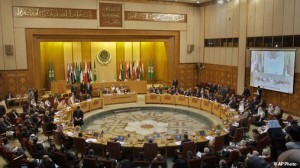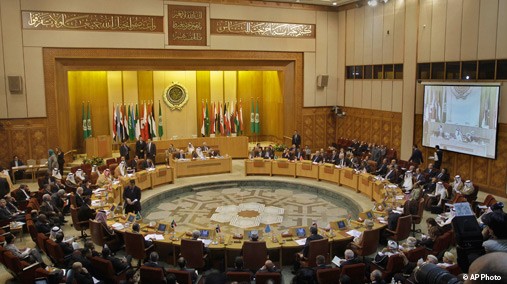
AP photo
Human rights organizations in the Arab world confirmed that the development and reform of the League of Arab States (LAS) requires the adoption of serious reforms, on top of which that the League embraces a new vision for its relationship with civil society, in line with the traditions and experiences established by similar regional groupings as well as United Nations agencies and organizations.
This suggestion was part of a memorandum sent last week by 37 organizations working in the field of defense of human rights in 9 Arab countries, including 4 regional organizations to Mr. Nabil Al Arabi, Secretary General of the League of Arab States and Mr. Lakhdar Brahimi, Chairman of the Committee for the development of joint Arab action at the Arab League, charged with preparing a plan for LAS reform to be presented to the next Arab Summit.
The memo indicated that the development of the relationship between LAS Institutions and NGO’s requires a revision of the standards approved by LAS regarding awarding consultative status to NGOs. These standards constitute a stumbling block hindering human rights organizations – and other active organizations in different fields – from obtaining this status, which is contingent upon two conditions, namely the consent of the Headquarters State and that the organization in question had been granted legal authorization. However, most of the countries where NGOs operate still impose severe restrictions on freedom of assembly and of association.
The memo called for the adoption of formal procedures and mechanisms allowing non-governmental organizations to attend the meetings and formal sessions of LAS bodies, and enabling them to express their views through these meetings. The memo also requested the development of mechanisms to ensure that NGO opinions regarding issues on the agenda of various meetings are heard and taken into consideration.
The memo commended the recent declarations made by Mr. Nabil Al Arabi, where he called for a review of the Arab Charter for Human Rights, in order to render it more compatible with international standards and instruments of human rights. The memo stressed also that the promotion of the role of LAS Standing Committee on Human Rights entails a far-reaching review of the Committee’s role and mechanisms of action. The memo proposed in this context that the Committee develops mechanisms for the appointment of special rapporteurs or specialized and thematic working groups with the competence to receive complaints and petitions, and investigate human rights problems within their jurisdiction, pursuant to United Nations and African Union norms.
The memo urged LAS to incorporate the Arab Commission for Human Rights in in the process of institutional reform, which is assigned to monitor the commitment of Arab governments with their obligations by virtue of the Arab Charter for Human Rights. It is necessary in this instance to develop mechanisms for positive interaction between the Commission on the one hand and NGOs on the other. The memo recommended that such mechanisms ensure NGOs view reports submitted by governments to the Commission, provide the Commission with information and reports that would assist in reviewing government reports, and that NGO’s are provided with the opportunity to attend review sessions of the said reports, which should necessarily be public.
The memo called for the development of the Commission’s website so that it would be possible to read its core documents, mechanisms of action, the rules it adopted for reporting, and its main findings and closing remarks during review sessions of government reports.
The memo also expressed the aspirations of the undersigned organizations for the Arab Parliament to play an active role in promoting and protecting human rights. The memo proposed in this regard that the Arab Parliament takes on the responsibility to set guidelines helping governments in the necessary revision of their legislation, in line with their international obligations arising from the ratification of international human rights conventions. The Arab Parliament should also revise legal rules adopted by the League through the frameworks of joint Arab action, to ensure they are consistent with human rights standards. The memo also called for reconsidering the rules of procedure of the Arab Parliament, to ensure openness to non-governmental organizations, and the adoption of mechanisms ensuring an active NGO presence in Arab Parliament sessions.
For the text of the memorandum
Undersigned Organizations
Regional Organizations:
1. Cairo Institute for Human Rights Studies
2. Arab NGO Network for Development (ANND)
3. Arab Network for Human Rights Information
4. Arab Penal Reform Organization
Egypt:
5. Center for Trade Union and Workers’ Services (CTUWS)
6. Human Rights Association for the Assistance of Prisoners
7. Group for Human Rights Legal Aid
8. Egyptian Center for Economic and Social Studies
9. Center for Adequate Communication Methods for Development (ACT)
10. Egyptian Initiative for Personal Rights
11. New Woman Foundation
12. NAZRA for Feminist Studies
13. Egyptian Association for Community Participation Enhancement
14. Association for Freedom of Thought and Expression
15. Egyptian Foundation for the Advancement of Childhood Conditions (EFACC)
Bahrain:
16. Bahrain Youth Society for Human Rights (BYSHR)
17. Bahrain Center for Human Rights
18. Bahrain Association for Human Rights
19. Bahrain Women’s Union
20. Bahrain Workers’ Union
21. Bahrain Sociologists Society
22. Bahrain Transparency Society
23. Awal Women’s Society
24. Al Nahda Bahrain Women Society
Morocco and Western Sahara:
25. Moroccan Organization for Human Rights
26. Moroccan Instance for Human Rights
27. The Sahraoui Association for Victims of Grave Human Rights Violations Committed by the Moroccan State
Saudi Arabia:
28. Human Rights First Society in Saudi
Sudan:
29. Journalists for Human Rights (JHR), Sudan
30. Al-Khatim Adlan Center for Enlightenment and Human Development, Sudan
Tunisia:
31. Committee for the Respect of Freedom and Human Rights in Tunisia
32. Tunisian League for Human Rights
Libya:
33. Lawyers for Justice in Libya
Lebanon:
34. Palestinian Organization for Human Rights – Lebanon
35. Amel Association, Lebanon
36. The Foundation for Human and Humanitarian Rights – Lebanon
Yemen:
37. Yemeni Organization for the Defense of Democratic Rights and Freedoms
Share this Post

